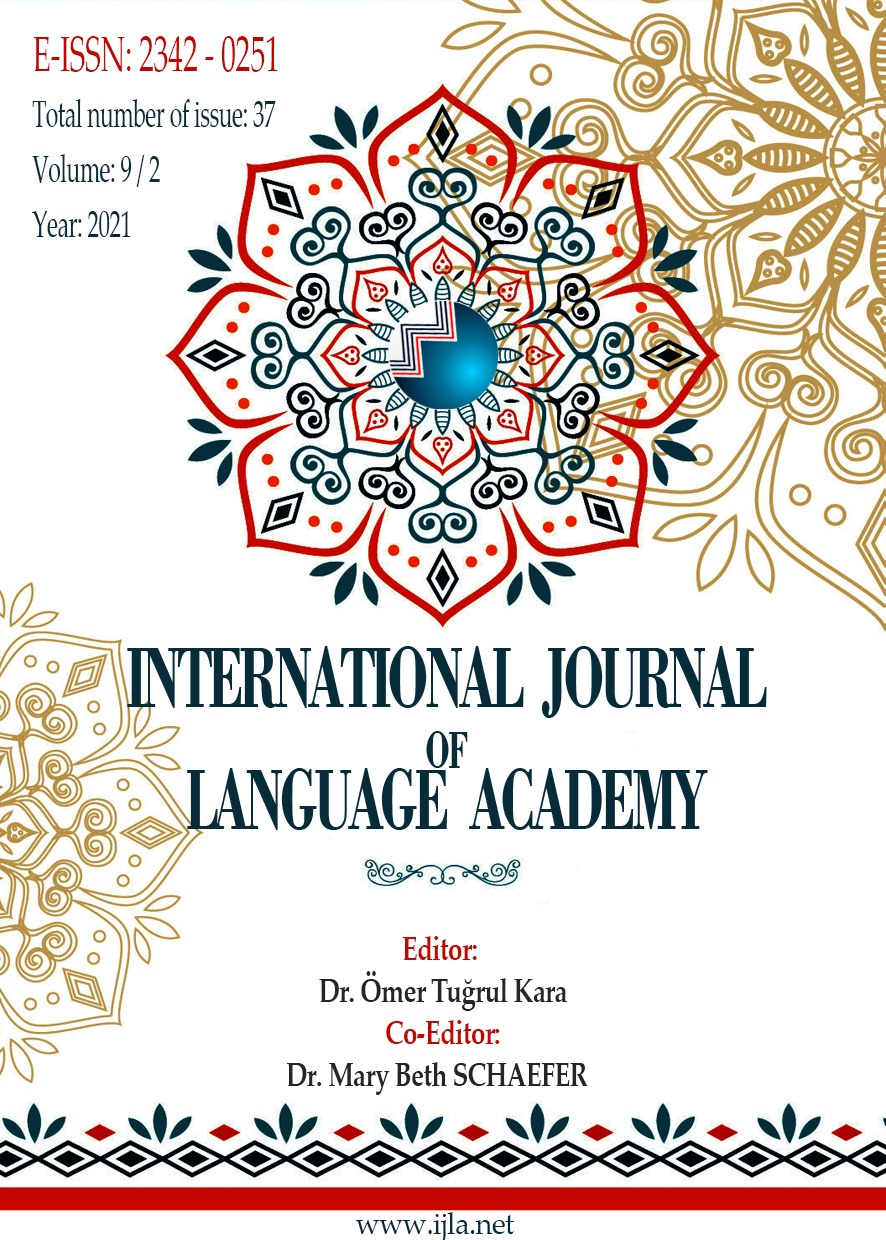Author :
Abstract
Düşünce ile söz arasında derin yapı çerçevesinde sıkı bir ilişki vardır. Öyle ki, düşünceler mecazî bağlamda bir su ise sözler bu suyu taşıyan kanallardır. Yazarın duygu coğrafyası, düşünce atlasında gezinmek istiyorsak onun söz haritasını bilmemiz gereklidir. Bu açıdan bakıldığında, nitel araştırma desenlerinden durum çalışması olarak ele alınan bu çalışmada, “La Confession de Claude” romanının Türkçe çevirisi olan Claude’un İtirafları (Yılmaz, 2011) ışığında Emile Zola’ya dilsel, üslupsal ve yazınsal bir bakış açısı getirmeye çalışacağız. Uygulamalı Söylem Dilbilimi çerçevesinde, Zola’nın sözlerinden hareketle onun düşünce ve duygu dünyasını söylemsel açıdan çözümlemeye çalışacağız. Bunu yaparken dilsel göstergelerden hareket edip metni söylem bakımından irdeleyeceğiz. Bağlam içindeki anlama, sözce yapılarına, bu yapıların çözümlenmesine odaklanırken Batı dilbilim kuramlarında kullanılan kimi özel terimlere yer verilecektir. Emile Zola’nın Claude’un İtirafları romanı, yazarının kişisel yaşamından izler taşıması bakımından önemli olduğundan, öznellik bağlamında bu kişiselliğin yapıtın sözcelerine nasıl yansıdığı gösterilmeye çalışılacaktır. Dilde öznellik olgusu dışında, söylemin devamlılığı, geçmişe dönüş, serzeniş/haykırma/kabullenme, sorgulama, doğrudan muhataba yönelme, yineleme/tekrarlama, ünlemsel ifade, bildirme sözcesi, duygu-düşünce ilişkisinde umutsuzluk başlıklarında derlenen sözcelerden hareketle edebî eserdeki dil-söz ilişkisinin boyutları ortaya konmaya çalışılacaktır.
Keywords
Abstract
There is a close relationship between thought and word within the framework of a deep structure. In a metaphorical context, thought is the water and words are channels that carry this water. If we want to navigate through the writer's emotional geography and atlas of thought, we need to know his vocabulary map. From this point of view, in this study, which is considered a case study of qualitative research designs, we will try to bring a linguistic, stylistic, and literary perspective about Emile Zola in the light of Claude’un İtirafları (Yılmaz, 2011), Turkish translation of the novel Claude's Confessions. Based on Zola's words, we will try to analyze discursively his world of thought and emotion in the framework of Applied Discourse Linguistics. While doing this analysis, we will set out from linguistic signs and examine the text in terms of discourse. While focusing on the meaning in context, the structures of the utterances, and the analysis of these structures, some special terms used in the Western linguistic theories will be included in the study. Since Emile Zola's novel Claude's Confessions is important in terms of carrying traces from the personal life of its author, in the context of subjectivity, we will try to show how the author's personality is reflected in his words (utterances). Apart from the phenomenon of subjectivity in language, based on the utterances compiled under the titles such as continuity of discourse, return to the past, reproaching/shouting/accepting, questioning, addressing directly to the interlocutor, repetition, exclamatory expression, declarative utterance (mood), and despair in the relationship between feelings and thoughts, the dimensions of the language-word relationship will be tried to be revealed.
Keywords
- Çetişli, İ. (2011). Batı edebiyatında akımlar. Eskişehir: Anadolu Üniversitesi Açıköğretim Fakültesi Yayınları.
- Dupriez, B. (1984). Gradus. Les procédés littéraires. Paris : (UGE) Union Générale d’Éditions.
- Jakobson, R. (1963). Essais de linguistique générale. Trad. en français par N. Ruwet.
- Kefeli, E. (2009). Metinlerle batı edebiyatı akımları. İstanbul: Akademik Kitaplar.
- Kıran, Z. & Kıran Eziler, A. (2001). Dilbilime giriş. Ankara: Seçkin Yayıncılık.
- Maingueneau, D. (2009). Les termes clés de l’analyse du discours. Paris: Seuil.
- Mazière, F. (2005). L’analyse du discours. Collection Que sais-je? Paris: PUF.
- Saussure, F. (1998). Genel dilbilim dersleri. Çev. B. Vardar. İstanbul: Multilingual
- Vardar, B. (2001). Açıklamalı dilbilim terimleri sözlüğü. İstanbul: Multilingual Yayınevi.
- Vardar, B. (1998). Dilbilimin temel kavram ve ilkeleri. İstanbul: Multilingual Yayınevi.
- Yılmaz, S. & Uras Yılmaz, A. (2009). Principes théoriques de la linguistique générale (Dilbilimin kuramsal ilkeleri). Paris: Service de Reprographie de l’Inalco, Langues’O.
- Zola, E. (2000). La Confession de Claude. Bruxelles: Editions Ancrage.
- Zola, E. (2011). Claude’un İtirafları. Çev. S. Yılmaz. İstanbul: İdeal Kültür Yayıncılık.
